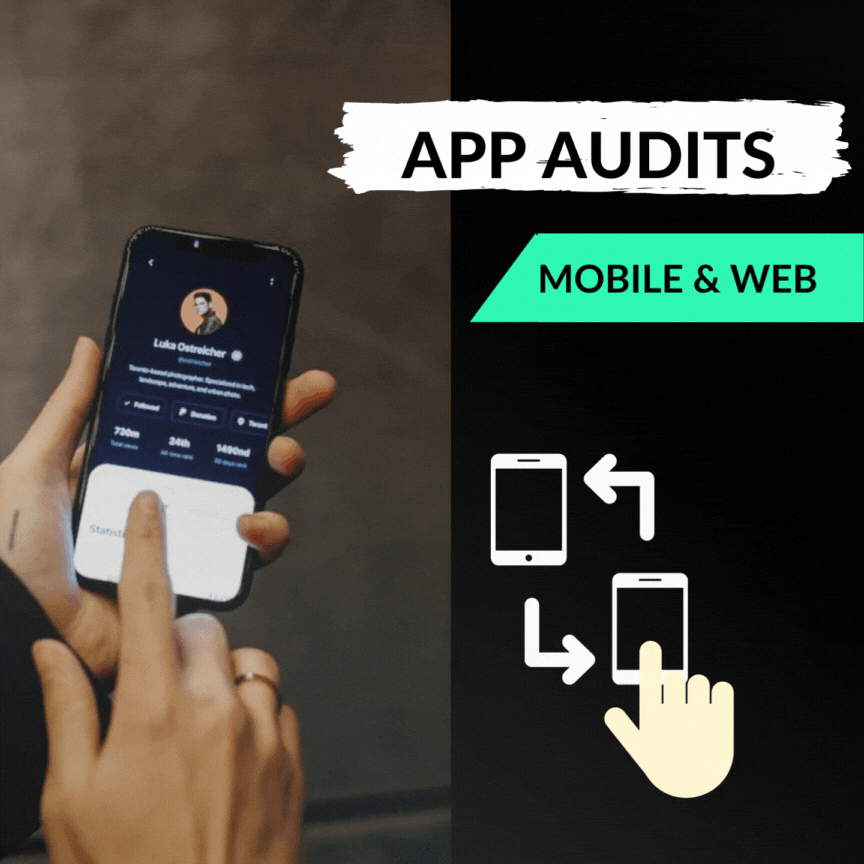An app audit is a thorough evaluation of a mobile or web applications that looks into various aspects of the software such as code, infrastructure, security, usability, and others. This evaluation can be specific to one aspect or encompass all aspects of the software, based on its intended purpose.

The two main ways to conduct an app audit are internally by the in-house team and externally by a third-party. Internal audits are performed more frequently and are conducted by the company’s own staff. On the other hand, external audits are performed by a neutral party and are used when the company requires an unbiased report, especially if the app needs to meet specific policies, licenses, and regulatory requirements. External audits are also carried out if the in-house team does not have the necessary expertise to carry out the audit.
The frequency with which an organization audits it’s app varies. Internal audits should be performed regularly, at least twice a year or once a year at the minimum. External audits, on the other hand, depend on the nature of the business and its needs.
Benefits of Conducting App Audits

The benefits of conducting an app audit far outweigh the costs incurred. Some of the significant advantages include optimizing outdated tools, efficient management of licenses and subscriptions, support in making business decisions, elimination of legal issues, and maintaining software quality.
Upgrading Obsolete Technology
A software audit can help identify the outdated tools and systems used within the app or it’s backend software. These outdated tools, libraries and services can slow down the performance of the software and make it less efficient. By identifying these during an audit, organizations can take steps to upgrade or replace them to improve the overall performance of the software.
This optimization can help improve the user experience and make the app more competitive in the market.
Informed Business Choices through Audit Results
An audit can provide valuable insights into the apps’s performance, usability, and potential for improvement. This information can be used to make informed business decisions about the software, such as investing in new features, upgrades, or even considering replacement options.
The audit can also provide insight into how the software can better align with the overall business strategy and objectives.
Streamlining License and Subscription Administration
An app audit can also help organizations manage their licenses and subscriptions used within their tech product effectively. By identifying the software components that are not being used, organizations can save on licensing costs by not renewing unnecessary licenses. This can result in significant cost savings and improved budget management.
In addition, an audit can help organizations ensure they are in compliance with software licensing agreements, avoiding potential legal and financial consequences.
Avoiding Legal Constraints through Audit Compliance
App audits can help organizations avoid potential legal issues by ensuring they are in compliance with all relevant laws, regulations, and licensing agreements.
For example, an audit can identify any legal issues that may arise from the use of the software, such as copyright infringement or unlicensed use of proprietary software components. By addressing these legal issues before they become a problem, organizations can avoid potential legal and financial consequences.
Ensuring High-Quality App through Continuous Auditing
An app audit can help organizations ensure they are producing quality tech. It helps identify any performance, security, or usability issues that may impact the user experience.
By addressing these issues, organizations can ensure their tech product meets the needs and expectations of their customers. This can help maintain the apps’s reputation and competitiveness in the market.
Regular app audits can also help organizations stay ahead of industry trends and advancements, allowing them to continuously improve the software to meet changing customer needs.
When should I have my App Audited?
It’s essential to have in place teams and processes to conduct regular testing and quality control before releasing an app or any updates to the app stores. Additionally, doing internal audits at certain regular intervals keep your app secure, current, and thriving!
However, there may be situations that call for situational audits, including external ones. In such cases, when should a app company should initiate an audit?
We recommend that it’s advisable to consider conducting an app audit when,
- You want to detect and fix every possible issue before doing a mega app launch or release major update.
- You intend to change your outsourcing or development partners. For example, if you aren’t happy with your app development partners and want to switch to another agency, it would be a good idea to have your app audited to get an idea of where it stands and what work is required from the new agency.
- If you are thinking about having the app re-designed and re-built, it would be worth having your current app audited to make sure is worth going through with it.
- The performance of the app has slowed down, and it’s not properly responsive.
- The app hasn’t been updated in a long time and requires new solutions.
- The user engagement and growth is decreasing and you aren’t sure why.
- The app has gone through a data breach or other security hazards.
- The product has stopped being efficient, and your in-house team cannot determine the problem.
- There is a need to reduce costs on maintenance of the app.
- Your in-house team doesn’t have the time or expertise to conduct a proper app audit.
What Kind of App Audit should I go for?
This depends on your goals of performing audit. The app can be audited on several fronts like Engineering, Design, Infrastructure, Security, Privacy, etc. Largely speaking, we can classify them into the below types.

Design (UX) Audit
The success of a mobile app or web app is often determined by its ease of access and navigation for users. That’s why a usability and accessibility audit is crucial before launching the app or if the active user base is not as large as desired.
Common issues found during this audit include overly complicated onboarding processes, resulting in high bounce rates, and a lack of user-friendly UI/UX design. These problems, however, can be fixed.
Source Code Audit
A comprehensive analysis of the frontend and backend code of a mobile app or web app is known as a source code audit. This type of audit aims to answer questions such as whether the code follows industry standards and how easily it can be maintained and scaled.
It also helps identify any existing bugs and potential future issues, determine outdated technologies, and provide recommendations for code improvement.
Infrastructure Audit
An infrastructure audit evaluates the performance of all the key components that are necessary for development, deployment, and server management. Special attention is usually paid to the server and the infrastructure that hosts it, as it plays a crucial role in data communication, authorization, access, gateways, and system management.
During this audit, costs, availability of services, documentation, and resource usage are closely analyzed.
Architecture Audit
The purpose of an architecture audit is to examine the components of a system and how they interact with each other to determine the system’s flexibility. This includes analyzing databases, services, integrations, and more.
Security Audit
The objective of a security audit is to detect and prevent potential security & privacy loop holes and threats, such as user data breaches, cyberattacks, and data loss, in order to protect a company from such events. If any hazards are detected, the audit offers suggestions for solutions such as strong firewalls, encrypted data transmission, secure authorization & access mechanisms, etc.
Maintainability Audit
The maintainability of a mobile app or web app is directly influenced by the quality of code and the technologies used. A maintainability audit aims to identify areas where maintainability can be improved by detecting outdated solutions and low-quality code, even though fixing these issues may be costly in the short term, it can reduce maintenance expenses in the long run.

How can you prepare for an app audit?
As an app business or organization, preparing for an app audit is crucial to ensure that the process runs smoothly and effectively. Before conducting an app audit, there are some important steps you should take to ensure that you are getting the most out of the process. This groundwork can help you identify potential issues and prepare for the audit in advance, making the process of identifying and fixing any problems much more straightforward.
Some of the things you should consider before going for an app audit are mentioned below.
Determine the Objectives of a App Audit
Before you start the process of conducting a mobile app or web app audit, it’s important to clearly define the reasons for the audit and what outcomes you hope to achieve.
This includes assessing the current state of your product, identifying any existing problems, ensuring security, and conducting a comprehensive analysis.

Prepare a Mobile App or Web App Audit Checklist
Once you have determined the objectives of the audit, you can create a checklist to guide the specialists who will be conducting the audit.
The checklist should outline the scope of the audit and the specific areas that need to be examined, such as third-party integrations, security, and sales funnel optimization.

Find a Reliable App Audit Partner
If your team doesn’t have the necessary expertise to conduct the audit or you want an objective assessment, you can consider hiring an outside team of specialists.
When evaluating potential partners, it’s important to consider their experience in the relevant industry, and to review feedback from previous clients.
Importance of Regular Internal Audits
While it’s not part of the preparation process for an external mobile app or web app audit, it’s important to note the value of conducting internal audits on a regular basis. Even if your team doesn’t have the expertise to examine every aspect of the product, conducting a partial analysis can help you prevent critical crashes and threats, making external audits less stressful, time-consuming, and costly.
Results of an App Audit
The outcome of a mobile or web app audit is a comprehensive report that outlines the findings of the examination. The audit report summarizes the identified issues, proposes solutions, and sets goals to be achieved before the next audit. The suggestions in the report are prioritized based on the urgency of the tasks, taking into consideration the budget available for immediate changes.
The report typically contains recommendations for code improvement, bug resolution, performance enhancement, security upgrades, and elimination of redundant tools. The report also includes estimates for code refactoring and rework scope, and in some cases, suggestions for software development vendors who can execute the proposed improvements.
If you choose to work with Extenova for your app audit, you can rely on our in-house team of business analysts, UI/UX designers, and software engineers to carry out the suggestions in the report. Our team has the experience and expertise to help you upgrade your product effectively.
Why choose Extenova for app audits?
Internal audits of mobile or web apps can play a crucial role in reducing the stress and the need for external audits. However, at times, the expertise of a third-party organization is necessary, and that’s where Extenova can help.
One of the reasons to consider an external audit of your app is to evaluate its investment potential. Just like a financial due diligence, a app audit is an important aspect of running a tech business and helps investors and buyers determine if their money is being used effectively and if the app aligns with their business objectives.
Consider the following examples, where an app audit can be really useful,
- if you’re planning to increase the number of users from 5,000 to 100,000, it’s crucial to ensure the app can handle such user growth.
- You’re planning change your app development partners. It’s essential to ensure that this transition is smooth for you as a business and also the app users. It’s also important for the new partner to understand what your app project consists of and what needs to be built further.
App auditing does not have to be a daunting task for your business. Regular internal evaluations can save you money in the long run and prevent critical issues from piling up. And even if the audit report highlights several issues that need attention, they can be addressed systematically and on your own terms.
At Extenova, we prioritize our clients’ resources and current priorities while working out a strategy to improve their products. If you have any concerns about the functionality of your app or simply want to ensure everything is working smoothly, don’t hesitate to reach out to Extenova for a free consultation.

